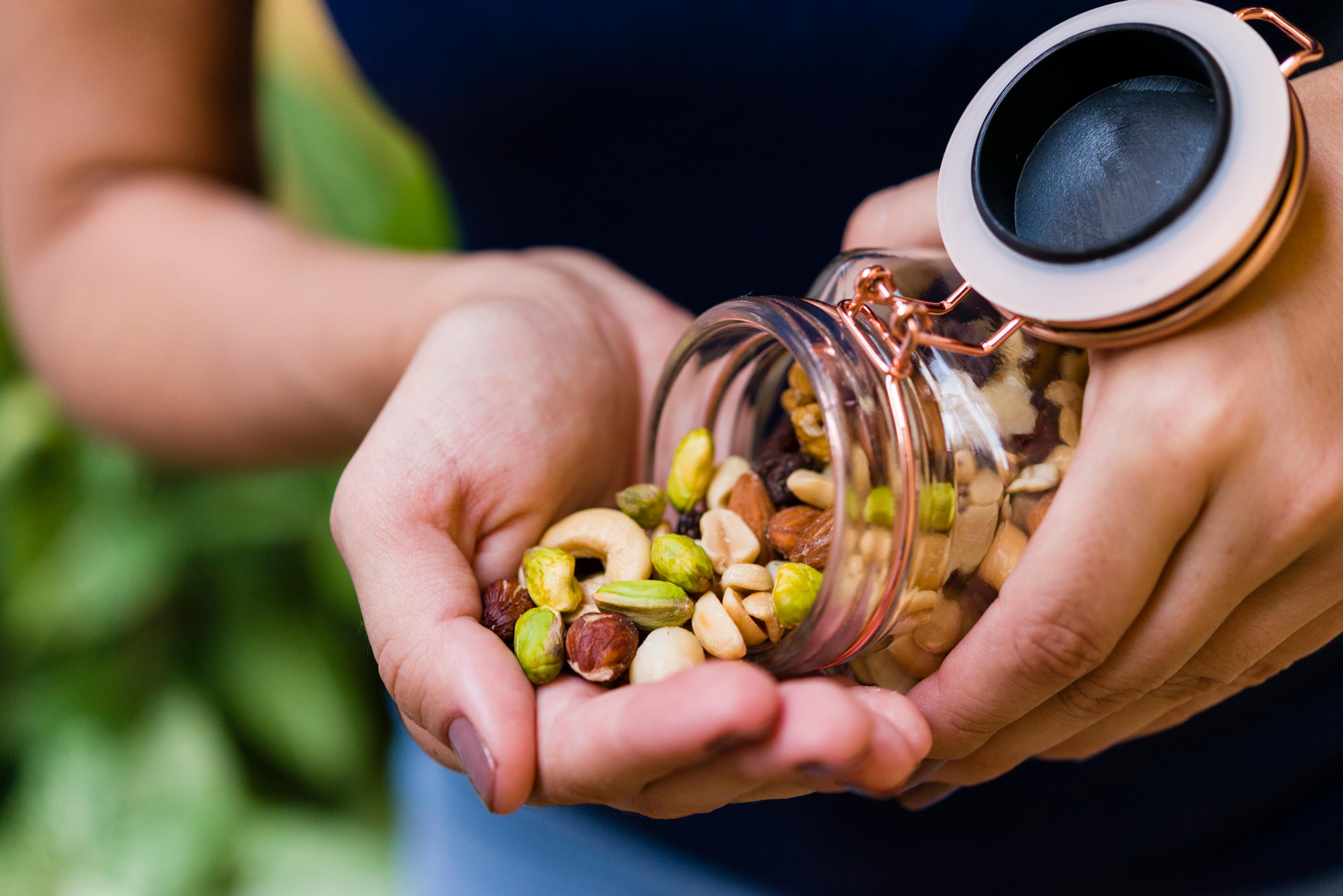What Numbers You Should Focus on for Good Heart Health
| 1 min read

00:00
00:00
About the Show
On this episode, Chuck Gaidica is joined by Mallory Applewhite, Vice President of Community Impact for the American Heart Association - Michigan. Together, they discuss what numbers you should be focusing on to maintain a healthy heart.
In this episode of A Healthier Michigan Podcast, we explore:
- Specific numbers we should prioritize for optimal heart health
- Everyday things we do that impact our heart health unbeknownst to us
- How to approach lifestyle changes to address and improve our numbers
- How to maintain a proactive approach to managing our heart health
Transcript
Chuck Gaidica:
Do you know what numbers you should be aiming for when it comes to your heart? Blood pressure, weight, all the fun stuff. This is a Healthier Michigan podcast, episode 150, and coming up, we explore what numbers contribute to good heart health. Welcome to a Healthier Michigan podcast. It's a podcast dedicated to navigating how we can improve our health and well-being through small, healthy habits we can all start implementing right now.
Do you know what numbers you should be aiming for when it comes to your heart? Blood pressure, weight, all the fun stuff. This is a Healthier Michigan podcast, episode 150, and coming up, we explore what numbers contribute to good heart health. Welcome to a Healthier Michigan podcast. It's a podcast dedicated to navigating how we can improve our health and well-being through small, healthy habits we can all start implementing right now.
I'm your host, Chuck Gaidica, and every other week we'll sit down with a certified expert. We discuss things like nutrition and fitness and a lot more. And on this episode, there's going to be a little math, so get ready, but you don't have to worry about doing too much of it. We're diving deep into numbers that surround our heart health and what we should be paying attention to and striving to maintain for good heart health.
With us today is Mallory Applewhite, who's got a master's in public health and also a bachelor's in kinesiology. She loves working with people in communities and taking them on their wellness journeys and health journeys to help improve things, including these numbers we're going to discuss. And I know you've got, is it a seven-month old, or is your baby older than that, keeping you running for your good heart health and steps?
Mallory Applewhite:
She is a seven-month old that's certainly keeping me on my toes.
Chuck Gaidica:
Well, that's good. That's good because that's what we're all striving for, right?
Mallory Applewhite:
Exactly.
Chuck Gaidica:
Yeah. Well, it's nice to have you with us. And I think about this, it wasn't too long ago, probably over this past summer, I did my annual physical. The majority of us have gone to the doctor's office. We get a routine checkup, then we go through our chart either with the doctor or we wait for results to come back home. And it's possible that maybe we don't think twice about having this information relayed to us unless the doctor shows some concern. You get that, oh, you don't want to hear that when the doctor's looking at your numbers. But that doesn't mean that we wait until we get to the doctor. We shouldn't be paying attention to these numbers until something goes wrong.
So on this episode, I thought maybe we could just cover what numbers we should be focusing on for good heart health and health in general and what they mean so maybe we're a bit more proactive in this new year. What do you think?
Mallory Applewhite:
Wonderful. I think that's a great place to start.
Chuck Gaidica:
All right, so if we tried to create a list, and I know I get all kinds of stuff when I get my blood work back, tons of numbers, some of them are stuff I've got to Google. But if we looked at the specific numbers, Mallory, that we should be prioritizing for maintaining optimal heart health, what would you say those numbers are?
Mallory Applewhite:
Absolutely. So Chuck, the first number when it comes to our heart health is our blood pressure. That number is so important. Our blood pressure lets us know exactly how hard our heart is working to get blood through our body and to ensure that our body is functioning in the proper way. So blood pressure number is very important.
Chuck Gaidica:
Is there such a thing as an average anymore for that? Because I've heard that the average has gone up, but if you look at your numbers, is there an average number, whatever over whatever that we should be looking at?
Mallory Applewhite:
Great question. Yeah. So you want your blood pressure to be anywhere between 129 over 80. That number, as you mentioned, Chuck is starting to increase between 120 to 130. However, if you do find that your blood pressure is creeping up to that 130 over 90, it's time to go meet with a health professional. We definitely want our blood pressure to not creep up in that way.
Chuck Gaidica:
Okay, that's good to keep in mind. So sorry, go ahead with the other numbers. What are they?
Mallory Applewhite:
Of course. So another number that's very important to our heart health is our cholesterol. A total maybe three or four numbers depending on who you talk to. We have our total cholesterol, we have our good and our bad cholesterols, which are our HDL and our LDL cholesterol. And then lastly, we also have another fat in our blood, if you will, that we consume, which is triglycerides. Our cholesterol overall lets us know how much fat and lipids that we have in our blood. And knowing our cholesterol numbers will help us to identify our risk for plaque buildup, having excess fat and lipids in our blood can cause plaque buildup in our arteries. It can also weaken our blood vessels, which ultimately increases our risk for heart disease, stroke, and other cardiovascular conditions. So cholesterol is a very important number to know as well.
Chuck Gaidica:
So you mentioned this relative to good and bad cholesterol. HDL is the good number, right?
Mallory Applewhite:
Yes, yes. So Chuck, my rule of thumb when it comes to our good and bad cholesterol, HDL, we want that number high, H for high. LDL, we want that number low, L for low. LDL cholesterol, that's our bad cholesterol. That's the cholesterol that starts to build up and create that plaque. Whereas HDL cholesterol is our good cholesterol that actually helps our body to get rid of any excess cholesterol that we may not need. So why we want our HDL cholesterol high is so our body can help to remove any excess lipids from our blood.
Chuck Gaidica:
And I think sometimes people think that if they see those numbers come in, because let's face it, some of us wait for it's a year and a half, or it's even more for the annual physical. We kind of kick the can down the road. But when we get those numbers back, there are things that we can do from a lifestyle standpoint that can directly impact those numbers, right? It's not a fait accompli, that that's it, you're stuck with a bad number somehow.
Mallory Applewhite:
Absolutely. Your numbers are not doomsday. Your numbers should really be looked at as opportunities, opportunities to make changes, and also to make lifestyle improvements. And there are small things that we can do on an everyday basis that can actually have a tremendous impact on our overall heart health.
Chuck Gaidica:
So before we get to those everyday things, I want to back up just a minute to the blood pressure issue because my dad suffered from hypertension his whole life, and sometimes it would go racing high. And it turned out for him, it had something to do with hydration. I would say, "Dad, did you drink your water today?" "No, I forgot." Or he'd have a fast food burger that's filled with sodium and forget to drink water and then all of a sudden ... You wouldn't think your blood pressure's going to go up from the combination of those two, but I saw it with my own eyes.
So hypertension, though, is also something as you talk about being in love with helping people in communities, there is a component of this that has to do with different cultures and race and ethnicities, right? Where some of us have more of a proclivity for hypertension and high blood pressure. Am I right?
Mallory Applewhite:
Absolutely. Our cultural, as well as our family history, all impact our propensity to have hypertension, diabetes, even an array of other chronic health conditions. So certainly being aware of your family history, also, the things that you are consuming in your diet are so important to our blood pressure. Also, I'll mention Chuck, you stated you get your numbers from your healthcare provider and you're working with your doctor. One thing that we also have to remember, medication. What we are finding also is that individuals who may be prescribed hypertensive medication aren't always adhering to their medication regimen. So that's another lifestyle change or component that you can do is to adhere to your medication regimen.
If there are any changes, if you find that maybe you're getting headaches, maybe a little bit of blurred vision, it's time to speak with your PCP or your primary care physician at that time because there may be an opportunity to make adjustments to your medication. And so it's so important to always have that continued conversation with your doctor.
Chuck Gaidica:
No, that's really good because, especially as folks get older, they tend to maybe put that on the side or they forget to take the meds or, in this case, like I mentioned, drink water. So I think that's really good. And I've also noticed over time, it's increased that Blue Cross may go out, visiting nurses may go out. You may be able to get your blood pressure taken. I know you can do it at your local pharmacy. Sometimes there's a little contraption there, if you don't have one at home. But when you're offered that opportunity, especially when it's free 99, you're getting it done for free because somebody came to work. That's a good time to check, just to double check, to make sure everything is still going steady, right?
Mallory Applewhite:
Absolutely. And we must remember, our blood pressure can change throughout the day. We can have an elevated or higher blood pressure reading in the morning versus in the afternoon. So any opportunity that you have to check your blood pressure, I say, do it. It never hurts to know your numbers.
Chuck Gaidica:
Yeah, that's good to know. So as we come back to these things that we can do that literally we have some control over that can impact the numbers you're talking about, where do you start to list those things out? How can we use them?
Mallory Applewhite:
Absolutely. Chuck, I love what you said just a moment ago, hydration. Drinking our water is so important for our overall health. Our body needs water. And more individuals, more adults, you'll be surprised to know are walking around dehydrated. If you are finding yourself thirsty throughout the day, you are beyond dehydration at that point. So consuming water, always keep a little cup of water nearby throughout the day. So that is one lifestyle change. Keeping it simple, one thing that I love to do when it comes to water consumption, well, I used to do before I kind of got into a better habit, is set alarms. Set an alarm at the top of every hour just to drink a glass of water just to get it down, especially for someone who has difficulty getting your water consumption in.
Chuck Gaidica:
No, that's really good. And a lot of hacks, some people take that big giant 55-gallon drum of water, and they know, Mallory, that if they've consumed it by the end of the day, that's their system. And they're like, well, that's it. I'm all set. Right?
Mallory Applewhite:
Exactly. And what's best is find what works best for you and your lifestyle. Chuck, some other great things that folks could do is being active, making sure that we are moving our body. Our bodies were designed to move, our bodies are in need of movement and exercise, but I really, really want to hone in on, exercise doesn't look the same for everyone. I'm not saying that someone needs to become a gym rat and go and pump iron four or five days out of the week. Simply just getting up, walking is so great for your heart health, getting our steps in. I know here in Michigan we are getting into the best time of year, our winter season, so it's getting cold outside, which can really impact our motivation to become physically active. But there are so many things that you can do right from your home. Standing, instead of just sitting on the couch. Also, housework counts as physical activity as well. So be creative when it comes to moving your body, but it's so important to get exercise in.
Chuck Gaidica:
I've got a buddy who, and we've known this, we hear these, Mallory, from time to time, these hacks for everybody, and it all depends. Even when you've been shopping, he'll park way in the back, not because he's afraid the car's going to get dented, because we all got to go through that. Like, oh, I just leased a new car. I'm going to park it way over there. He parks way over there. And I said, "What are you doing?" He said, "Well, because I want to walk and get all these steps in to cross the parking lot." And of course, then, if you're going to the big box store, especially in the winter when there could be ice, if you track your steps from one corner of those giant stores to another, oh, you're getting steps all right.
Mallory Applewhite:
You certainly are. And Chuck, if you're shopping with me, you'll get twice as many.
Chuck Gaidica:
And then the seven-month-old, right? I know you could use the cart, but come on, at some point you're going to carry...
Mallory Applewhite:
That's my weight training there.
Chuck Gaidica:
So what else can we be thinking about then? Because diet or now lifestyle change, as it's called, is really important.
Mallory Applewhite:
So diet. Diet, certainly what we are consuming is so important. Processed foods are certainly high in sodium. Those prepackaged meals, frozen meals, yummy potato chips, and all those things are extremely filled with sodium and other processed things that are very detrimental to our heart health. So ensuring that we are having a healthy diet filled with fruits and vegetables. What I like to do when it comes to my nutrition, I follow the rule of addition versus subtraction. I like to look at nutrition and healthy eating as what can I add to my plate versus taking away. Sometimes when we subtract things that we really enjoy, it's hard to stick to a diet when we're being so strict. So changing our mindset and just adding more vegetables, more of the healthy things to our plate and not taking away the things that we enjoy can really help to support in better health through our diet.
Chuck Gaidica:
Yeah, that's really good. And of course, we just talked about this, I think in the last episode, we also are adding fiber, water. I think a lot of people think that when it comes back to that hydration issue, well, coffee or a diet soda or even alcohol. Well, I'm getting fluid. Well, sometimes those fluids are contradictory. They can actually give you trouble. You're not hydrating the same way water gives it and the stuff the water that's tied up in an apple or an orange or something.
Mallory Applewhite:
Exactly. Chuck, not all liquid and beverages are equal. Some of those beverages that are unhealthy can actually cause us to become dehydrated, because we're eliminating things from our body through those sugary beverages such as pops and juices. So certainly having water is important. One last thing too, Chuck, that I really want to share that helps improve our heart health, which I think we often forget about is sleep. Sleep is so important for our body, our mental and our physical health. While we're sleeping, it allows our body to rest but also rejuvenate. And while we're sleeping, our blood pressure is also lower so our body can function properly and do all the things it needs to do. But when we are going off limited sleep, limited rest, and we're always on the go, which this time of year who isn't, it can really wreak havoc on our heart health. So getting at least seven to eight hours of sleep a night as an adult is very important to your heart health as well.
Chuck Gaidica:
And we know there are those asterisks in life. Having a new baby, that changes your sleep. I love that phrase sleep hygiene, because every time I think of it, I think it just sounds like something I need to pay more attention to. Let's not go to bed with an electronic device, let's make sure the lights are off so I can actually go to sleep. So it's good to think of it as hygiene, just like you would any other daily thing, like brushing your teeth.
Mallory Applewhite:
Absolutely. I think as technology has grown, we have become so consumed with being in touch and connected to our devices, and it's so important to disconnect, allow yourself, your mental also, to just kind of have a break for a bit. Enjoy time with your family, get active, go for a walk. But that sleep hygiene is so important.
Chuck Gaidica:
So what advice would you give to somebody who's looking to maintain this idea of a proactive approach to managing their heart health? Where do they even start? Because for some folks, they're like, well, yeah, I could start eating oatmeal or I can read the side of cans. That all makes sense, but I'm still kind of flummoxed about what to do. How do we start this?
Mallory Applewhite:
First and foremost, Chuck, is to identify a primary care physician. If you have not identified a doctor or provider, please work with a professional who can walk with you on your health and your wellness journey. So that's first and foremost. Another tip that individuals can do is to implement small lifestyle changes. There are so many things we are being inundated with. Eat healthy, be active, drink your water, do this. Sometimes it can just be really overwhelming and consuming. So I always like to tell individuals, pick one area to focus on. Become an expert in that area. Get comfortable, develop actual sustainable lifestyle changes in that one area so that way, one, you could feel rewarded. We love that gratification, feeling accomplished, helps to keep us motivated and going forward.
So if your one thing for next year, 2024, as we are going into a new year is to adapt a healthy lifestyle, maybe starting with your sleep, your sleep hygiene, unplugging maybe an hour or two hours before bedtime, putting your phone away in the kitchen or in a drawer or wherever you find to be the most convenient place to just to stay away from it. But starting with your sleep hygiene for the first quarter of the year. But just small changes, focusing on one area at of time and ensuring that you are developing sustainable changes over your lifetime, if you will, will overall have a helpful impact on your heart health.
Chuck Gaidica:
I love that so much because, Mallory, I'm kind of picturing a pie, not a real pie, so I'm not talking about that, but just slices of various parts of my life and my fitness, my emotional fitness, my spiritual fitness, my financial fitness. All of these things can cause us to lose sleep or to have high blood pressure. So to focus on that one area and have baby steps for maybe it's just a month and then you say, got it. I'm drinking more water or I'm sleeping better, now I can move to the other slice of pie. And before you know it, the car doesn't feel like it's pulling to the right or left, it's actually going straight. And you're like, yeah, this is working.
Mallory Applewhite:
Honestly, you'll look up and you're like, whoa, I'm consuming my water. I'm getting more fruits in and I'm walking for 30 minutes. Who is this person?
Chuck Gaidica:
Right. No, that's awesome. Well, as we start to wrap it up, you've given us a ton of stuff, and some of it seems pretty easy to adapt to, but yet, it still can be challenging based on weather and family issues, et cetera. But give us the bullet points. What should we be thinking about when it comes to our heart health numbers that we can actually impact in this next year to make us better?
Mallory Applewhite:
Absolutely. So when it comes to those numbers, knowing our blood pressure values, knowing our cholesterol are so important to our overall health. When it comes to impacting those numbers, the things that you can do is increasing your water consumption, working with a primary care provider, increasing your physical activity, just simply moving your body. And also, drinking, did I say drinking plenty of water?
Chuck Gaidica:
Yeah, but you can say it again. It's okay.
Mallory Applewhite:
So I can say it again, because it's just that important. Drinking plenty of water is so important, Chuck.
Chuck Gaidica:
Yeah. Well, this has all been great stuff. And the other part of everything you talked about, and I bet you've seen it in your family because, oh my gosh, to live with somebody with a master's in public health, now there's a little pressure. But the idea that you can become an influencer in this new year for your spouse, for your kids, for your parents, for whatever it is, they start to see these changes in you or you start talking about sodium or, and they probably would be like, who is this person? But you could affect change of the people in your circle because you are getting yourself in better shape. What an awesome opportunity.
Mallory Applewhite:
Absolutely. It's the trickle-down effect. I love it. And sometimes, it's best to show people versus telling people. So live, live by those actions and those habits.
Chuck Gaidica:
Well, Mallory Applewhite, it is sure good to have you on this podcast, and I hope we see you again soon. And thanks for all the good stuff. You've encouraged me today, and I bet a whole lot of other people too.
Mallory Applewhite:
Thank you so much, Chuck, for having me. It's been a pleasure speaking with you today.
Chuck Gaidica:
Yeah, take good care. Well, we thank you for listening to a Healthier Michigan podcast, brought to you by Blue Cross Blue Shield of Michigan. If you want to know more about the show, you can always check us out on our newly refreshed website. That's one place to go, a healthiermichigan.org/podcast. You can find all kinds of great things. Leave us a review or rating on Apple Podcast or Spotify. We've got a YouTube channel, so basically you can watch the videos, you can even take that with you and still go for your walk inside or outside and just listen to the audio. You can also follow us on Facebook, Instagram, or Twitter, and you can get all the new episodes like this one, or maybe an old episode or two because we've got a lot of them on your smartphone or tablet. And be sure to subscribe to us on Apple Podcast, Spotify, or your favorite podcast app. I'm Chuck Gaidica, stay well.





